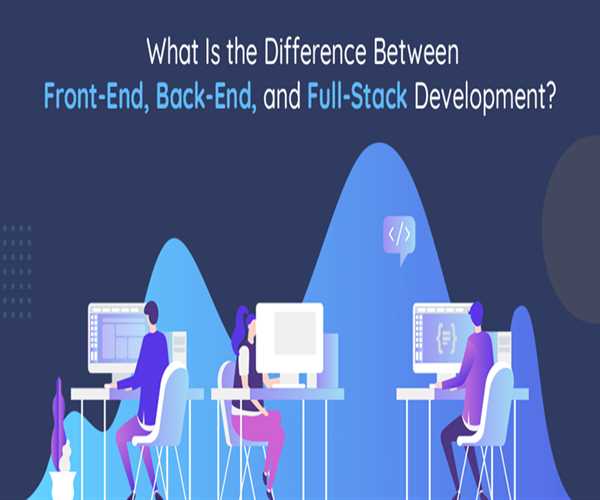
11-Nov-2022
What Is the Difference Between Front-End, Back-End, and Full-Stack Development?
Front-end, back-end, and full-stack developers cooperate in designing a website's appearance, style, and usability. Each of them performs specific duties and has specialized skills in coding that make them unique.
Typically, a web page is developed by a team of developers who handle everything from URL creation to layout, interactive features, and visual design. Common terminology used in software development to describe such a team is “front end,” “back end,” and “full stack.”
The question is, how do you know which type of web developer can help you with your project? This article explains what front-end, back-end, and full-stack development are and how they differ.
But before we get to these three main roles, let’s define what web development really means in the first place.
What is Web Development?
The term web development refers to the process of designing, developing, and maintaining websites. There are several aspects to it, including designing websites, publishing online, coding, and handling databases. In other words, website development involves creating online applications, which are websites.
Today, every business needs a website to keep up with the game. With web development trends and industry standards constantly evolving, developers have plenty of work.
There are multiple skill sets involved in web development, as well as different career paths.
No matter how new you are to web development, you have probably heard 'front-end development' and 'back-end development' at least once. The question is, what does it mean?
Front-End Development - Definition & Job Significance
In a website, the front end is where users interact with the site.
The entire look and feel of a website, beginning with the logo up through the search bar, icons, website design, and user experience, is the work of a front-end developer. Basically, Cascading Style Sheets (CSS) are the body of the website skeleton, completed using JavaScript, HTML, and the developer’s knowledge.
Front-end development involves interacting with visitors and code, understanding browsers and their abilities, as well as how content is displayed across platforms with different technologies.
A front-end developer should be acquainted with frameworks such as:
- Bootstrap
- TypeScript
- Backbone
- NodeJS
- ReactJs
- EmberJS
The user experience is then created as a result of combining all those, translating them into web-speak, and creating the user interface. This would allow them to make content that looks great across devices, as well as libraries such as jQuery and LESS.
They also write code more efficiently that way.
Excellent front-end developers will also be knowledgeable about event-based interaction, privacy, and scalability. Although knowing design would be a plus, it isn't a necessity.
Back-End Development - Definition & Job Significance
“Back End” is the server-side part of the application. Simply put, back-end development involves ensuring the website functions properly by focusing on databases, back-end logic, APIs, architecture, and servers.
The back-end developers are responsible for building the logic behind a website or application. In addition to coordinating with servers, they also deal with APIs (Application Programming Interfaces), among other things.
Their role also includes maintaining the technology within the server and database. A back-end developer works with the owner to understand the website's functions and requirements.
After translating the requirements into technical specifications, they will determine the most effective approach for implementing them.
In order to create applications and databases that communicate with one another, back-end devs rely on the languages to develop applications.
- PHP
- Ruby
- Python
- Java
- .Net
They also use databases such as MySQL, Oracle, and SQL Server to store, retrieve, or modify data and make it available in front-end code.
Full-Stack Development
Full-stack developers are experts in several fields. Even though each 'end' requires a considerable amount of knowledge, a developer with expertise in databases and browsers can easily work on both.
It was Facebook's technical department that introduced the role to the world. By working cross-functionally, a full-stack developer can work on every aspect of the IT stack, i.e., front and back end. In other words, full-stack developers offer a full suite of services.
Full-Stack Developers may tackle both sides of web development at the same time, or they may concentrate on a single area during a bigger project. Given that full-stack developers possess two sets of skills, their popularity is generally high, primarily because of their efficiency.
Note: Full-stack development is difficult to compare to front-end and back-end development since it combines both.
Front-End Web Development Vs. Back-End Web Development
In essence, front-end development involves designing and developing User Interfaces (UI) and User Experiences (UX) with a user-friendly, adaptive interface compatible with different browsers and devices.
On the other hand, back-end development relies on client interaction and an understanding of organizational structure and relationships.
Additionally, there is a heavy emphasis on data, with back-end developers working with various databases and service providers to integrate data.
Here’s an example so you can understand each type of web development better.
When there isn't a back-end developer, consumers won't be able to meet their needs appropriately, defeating the purpose of having a business website. On the other hand, front-end developers make sure that visitors are satisfied each time they visit a web page.
Other differences include:
- A front-end developer gathers information from users, while back-end development handles user input.
- The goal of a front-end developer is to create features that will enhance the user's experience. At the same time, back-end developers discover new functions and work closely with designers, developers, and IT managers.
- The responsibilities of front-end developers include search engine optimization and usability, while those concerned with security and disaster recovery are the job of back-end developers.
Needless to say, full-stack technology encompasses every aspect of a computer software program. As for full stack developers, they’re professionals who work with web applications on the front end and the back end.
So, there’s essentially no major difference between full-stack developers and front-end or back-end developers, except that full-stack developers have more expertise.
Types of Web Development - Conclusion
In a nutshell, front-end development deals with the appearance of web pages (the user’s end). A web page's back end refers to what makes it work (its server-side code). In general, full-functioning websites require both front-end and back-end development.
Full-stack developers work on the side of web programming, plus front-end code that controls how content appears to visitors.
There are many aspects to web development.
The world of web development is rapidly changing, so staying on top of all the latest tools is an ongoing task. In order to stay current with the latest trends in the market, it's best to rely on the services of a credible software developer company.
It doesn't matter what kind of web developer you're looking to hire, The One Technologies is a well-known IT company, ready to rush to your aid. As part of their job and passion, our web developers always learn the latest web development tools.

Co-Founder
Having 14 years of experience in IT industry, he is taking the company in its mission and growing it into a global community of creative entrepreneurs and their customers with his leadership. He keeps the business tight and together by his innovative thinking with strong strategic planning.
Join Our Newsletter
Subscribe to our newsletter to receive emails about new views posts, releases and updates.
Copyright 2010 - 2026 MindStick Software Pvt. Ltd. All Rights Reserved Privacy Policy | Terms & Conditions | Cookie Policy